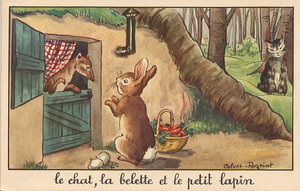 {3:54 minutes to read}
{3:54 minutes to read}
One day, a weasel finds an abandoned rabbit hole.
Without hesitation he appropriates the hole and makes it his home.
When the rabbit returns, he can’t enter any more.
This leads to a discussion between the rabbit and the weasel:
Which law would apply in this case?
The official legislation on property?
Finders keepers?
Survival of the fittest?
This story is the first part of a fable by de La Fontaine, one of the many fables I had to memorize during my school years in France!
I remembered this tale as I was answering a question from John, one of my clients who said he could no longer remain under the same roof as his wife while they were negotiating their divorce.
His concern was whether his moving out would impact his half ownership of their marital home. His wife kept saying to him that if he left, the house was hers only.
I told the parties that ownership of the house is usually defined by the mode in which it was acquired and whether it is marital or separate property.
- Marital property is property acquired through work by either spouse during the marriage.
- Separate property is property owned before the marriage, or property that one spouse may have inherited or received as a gift during the marriage and which has remained in their name.
Within these definitions, there may be circumstances that could affect part or all of the ownership of property. Each situation would have to be examined on a case by case basis.
If the marital home is titled in both names, there would be a presumption that it is jointly owned. John’s moving out would not threaten his ownership interest; however it may jeopardize his right to live in the house in the future. (In that way, possession is 9/10 of the law.)
Spouses could sign an agreement establishing that moving out while they are working on their separation agreement, will have no consequences on their living, parenting or asset sharing decisions.
So my answer to John’s question was that in principle, his moving out would not affect the ownership of the house, as long as he and his wife are working on their separation/divorce agreement in mediation. However, if John were to set up a new residence for a couple of years, and the parties make no agreement, a court may have a different view of his share of the house.
For those who are curious, and this has nothing to do with this blog article, here is the unfortunate ending of the fable:
They decide to call upon Raminagrobis for an impartial opinion. Raminagrobis is a big and wise cat, often called upon as a judge in disputes like this one. Raminagrobis asks the rabbit and the weasel to come a bit closer … a little more … just a little bit …Once they are within his reach, he leaps forward. He puts his claws and his weight on his victims. They end up as his meal.
*Note: The information contained in this article does not constitute legal advice.
Jennifer Safian
divorce and family mediation
upper east side of manhattan (nyc)
new york, ny
(917) 881 5206
jpsafian@gmail.com
Latest posts by Jennifer Safian (see all)
- misinterpreting your partner’s demeanor may lead to conflict - October 9, 2024
- demystifying the money talk - September 11, 2024
- why are we afraid to discuss money? - August 21, 2024





If this is how the cat resolves disputes, I can’t imagine why he’d ever be called on to mediate(?!?!?) :-)))))